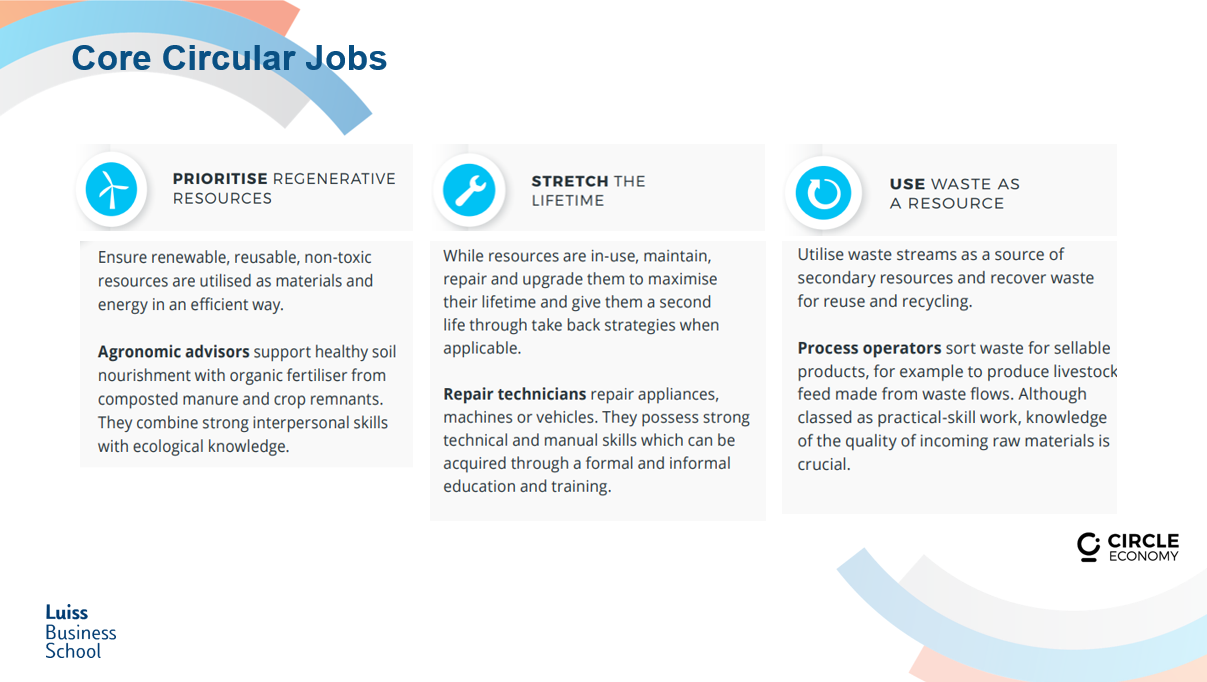
THE JOBS OF THE FUTURE
On March 14th, during the Week of Circular Economy (trans.) in the Netherlands, Luiss Business School Amsterdam and Holland Circular Hotspot organized an online masterclass on ‘The jobs of the future – a career blueprint in Sustainability’.
The hosts, prof. Freek van Eijk and prof. Katrin Muff are both established thought leaders in the space of circularity, sustainability and impactful leadership. They are also scientific co-directors of the Master in Sustainable Business Management offered by Luiss Business School Amsterdam.
You can enjoy the full masterclass through Vimeo, or read on to get the main takeaways.

THE WEF REPORT
In an era characterized by rapid technological advancements and increasing environmental concerns, the landscape of job opportunities is undergoing a profound transformation. The Future of Jobs Report 2023 of the World Economic Forum (WEF) explores how jobs and skills will evolve over the next five years.
- Developments will be strongly influenced by environmental, technology and economic trends
- The strongest net-job creation will be driven by investments for Green transition, application of ESG standards and localizing supply chains
- Significant job growth is expected in education (10%), agriculture (30%) and digital commerce and trade (4MM)
As industries strive to adapt to a more sustainable future, professionals (and businesses) are seeking guidance on how to navigate this evolving terrain.

SKILLS FOR THE GREEN TRANSITION
According to “The green employment and skills transformation” (CEDEFOP, 2021), building a successful career in sustainability requires a unique blend of skills encompassing both technical expertise and soft skills.
- Technical Skills – required to implement standards, processes, services, products and technologies to protect ecosystems and biodiversity, and to reduce energy, materials, and water consumption. Technical skills can be occupation-specific or cross-sectoral
- Transversal Skills – linked to sustainable thinking and acting, relevant to work (in all economic sectors and occupations) and life. Alternatively referred to as ‘sustainability competences’, ‘life skills’, ‘soft skills’ or ‘core skills’.

CORE CIRCULAR JOBS
In the quest for a more sustainable future, the concept of the Circular Economy has emerged as a guiding principle for reimagining our approach to production, consumption, and waste management.
At the heart of this paradigm shift lies the notion of circularity – the idea of designing out waste and pollution while keeping products and materials in use for as long as possible.
As industries around the world embrace the principles of circularity, a new breed of professionals is emerging to spearhead this transformative agenda.

ENABLING CIRCULAR JOBS
The transition towards a more sustainable and regenerative model of resource use requires not only dedicated professionals but also a supportive ecosystem of enablers. These enablers play a pivotal role in fostering innovation, driving policy reforms, and facilitating collaborations that accelerate the adoption of circular practices across industries.
Source: Circle Economy – Circular Jobs Initiative
Watch the Masterclass to learn more about the five enablers shaping the landscape of circular jobs and propelling the circular economy forward.

MASTER IN SUSTAINABLE BUSINESS MANAGEMENT
And speaking of enablers, the Master in Sustainable Business Management is designed to empower you with the knowledge and leadership skills to drive transformative change towards a sustainable future.
This one-year full-time programme in Amsterdam is for you if you are committed to making a positive impact with your business career, and interested in sustainability tools and strategies and their application into practice.